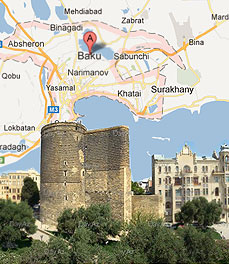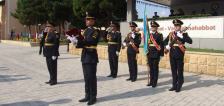Commandant form of government was established in the territory after Azerbaijan was annexed to Russia in 1828. In 1840 the Czarist government established guberniyas in the Transcaucasus which included in the Russian Empire by passing a law on the administrative-territorial division. Commandant form of government was liquidated and replaced by guberniya, county and local management system. The structure of county included chief of the county, county court and chief of the town.rəçilik
Implementation of the accepted decisions was carried out by police officiary (a minor official in czarist Russia). On April 10, 1840 there was established a police department subordinated to the Ministry of Internal Affairs of the Russian Empire in Baku. Baku city Polis Department started its functioning from January 1, 1841.
Since its establishment Police Department achieved certain successes in ensuring public safety in Baku city, struggle against crime was systematically organized, and had an undeniable role in preventing workers’ rallies and mass actions at oil fields. Guba county was annexed to Baku city in connection with implementation of a new administrative-territorial reform in 1860 and Baku Guberniya was established.
Local management replaced by police chiefs of small areas following reforms carried out from 1841 to 1867. Being subordinated to the county police chiefs, local police chiefs did not have residence and did not carry secretarial work.
Guberniya-gendarme police department was established in Baku in 1867. In 1868 Baku Police gendarme department became county police department. Baku Provincial police department consisted of a chief, his two assistants, secretariat, two executor, translator, policemen who sent documents and those who controlled places of detention.
In 1867 there was established a police department in Baku Guberniya.
For the first time there were established bodies of internal affairs subordinated to the Ministry of Interior in the form of a system in the Russian empire in the result of reforms carried out during 1870 – 1880s.
Baku Police Department consisted of police master, investigative and special police officers, as well as deputies elected from population of the city.
On December 31, 1882 Baku city police was divided into 2 parts and 6 provincial police with the decision of the governor of Baku. There were several policemen at each provincial police. Baku county police areas were as follows: Baku area, Mashtagha area, Saray area, Balakhany-Sabunchu area, Keshla area, Bibiheybat area. In 1897 Baku-Sabunchu Police Mastership was established.
On October 28, 1906 Baku Police Department became Police Mastership Department. It included 10 pristav (a former Russian supervisory official) departments, harbor police and Police Mastership Reserve Force.
 On February 21, 1908 the “Guidance of Baku Police Mastership Investigation Police” was approved. Baku Police Mastership Investigation Police consisted of chief, his assistant, clerk and 4 police supervisors.
On February 21, 1908 the “Guidance of Baku Police Mastership Investigation Police” was approved. Baku Police Mastership Investigation Police consisted of chief, his assistant, clerk and 4 police supervisors.
 In 1911 there was established anthropometric and fingerprint bureau within the Baku Police Mastership Investigation Police. The staffs of Baku Policemastership were established on March 23, 1912.
In 1911 there was established anthropometric and fingerprint bureau within the Baku Police Mastership Investigation Police. The staffs of Baku Policemastership were established on March 23, 1912.
Thus, there was a police master, his 2 assistants, 11 pristavs (a former Russian supervisory official), their 11 assistants, 86 block supervisors, 960 policemen per staff and an office staff of police master department.
In February, 1913 Baku police transferred to shift work in connection with the increase of population in Baku.
In February, 1914 Baku Address Table was subordinated to the Baku Police Mastership by the decision of the Baku Duma.
In September, 1916 there was established a Registration department within Investigation Police of Baku Policemastership.
On March 7, 1917 there was established Baku city Militia subordinated to the Executive Committee of the Soviet of Baku Workers’ Deputies. On November 13, 1917 police authorities were released and Baku Soviet made a decision on arranging Soviet militia instead of it.
On May 28, 1918 Azerbaijan Democratic Republic was established. The first Ministry of the Interior was founded and functioned in the period of ADR to ensure security and public order in the country. Although Azerbaijan Democratic Republic survived about 2 years, only 23 months during 1918 – 1920 but now real experience of independent statehood has a role of historical example in terms of heredity. The great leader Heydar Aliyev said: “Azerbaijan Democratic Republic done a lot in 2 years and laid the foundation for independent future of Azerbaijan. We are successors of the Azerbaijan Democratic Republic. Today, I proudly say that we are faithful successors of the Azerbaijan Democratic Republic".
 The special investigatory commission of the MIA was approved by the decision of Azerbaijan Democratic Republic dated August 31, 1918, that commission was assigned to investigate genocide of March 1918, the crimes committed against Azerbaijanis in Zangazur and Karabakh. In the autumn of 1918 there was opened a “Policeman school” in Baku, in the Old City, preparing police officers.
The special investigatory commission of the MIA was approved by the decision of Azerbaijan Democratic Republic dated August 31, 1918, that commission was assigned to investigate genocide of March 1918, the crimes committed against Azerbaijanis in Zangazur and Karabakh. In the autumn of 1918 there was opened a “Policeman school” in Baku, in the Old City, preparing police officers.
In 1919 the total number of Azerbaijan police was 9661. In 1918-1920 Goychay, Javad, Guba, Lankaran counties were incorporated into the Baku Guberniya. The territory of the Baku Guberniya was 39.075.15square kilometers. In the period of the Russian Empire Baku Police was named “police mastership”, in the period of the Azerbaijan Democratic Republic “police”, in the period of the Soviet Union "militia" and in the period of the independent Azerbaijan Republic “police”.
 Azerbaijani people who established their independent state in 1991restoring historical justice faced with internal crisis, foreign aggression in the first years of independence, the chaos in the country affected the police too. Incompetent management of those in power paralyzed the activity of law enforcement agencies, including the internal affairs bodies.The unstable social and political situation existing at that time aggravated criminogenic situation in Baku city as in all parts of the country, enabled elements of organized crime activities, and armed groups. In such a situation, Armenian aggression made the situation even harder.
Azerbaijani people who established their independent state in 1991restoring historical justice faced with internal crisis, foreign aggression in the first years of independence, the chaos in the country affected the police too. Incompetent management of those in power paralyzed the activity of law enforcement agencies, including the internal affairs bodies.The unstable social and political situation existing at that time aggravated criminogenic situation in Baku city as in all parts of the country, enabled elements of organized crime activities, and armed groups. In such a situation, Armenian aggression made the situation even harder.
Azerbaijan did not have national army in the first years of the war, therefore the police were martyred fighting on the front line for the land. The great leader Heydar Aliyev highly appreciated Azerbaijan police services during this period: "In particular, after the start of the events of 1988, 932 Azerbaijani police officers were killed and 681 persons became disabled in the Karabakh war. At the same time, 67 police officers were honored with the title of National Hero. It is an example of great gallantry, heroism and loyalty to the statehood”.
Return of the nationwide leader Heydar Aliyev, who had unexampled historical services in the restoration of comprehensive development of Azerbaijan state and our national statehood traditions, to power in June, 1993 with the demand of people, his wise and decisive steps taken in the fields of strengthening our independence and statehood, establishing law and order in the country, putting an end to the chaos and arbitrariness, getting out of socio-political and economic crisis, eliminating illegal armed groups, solving the numerous problems facing our people, strengthening law enforcement agencies were greeted with sympathy and respect of the population of our republic.
Thus, after return of the great leader Heydar Aliyev to power, foundation of substantial quality changes in the activity of the internal affairs bodies was laid.
The principles of legality and statehood stepped to the foreground after the appointment of mister Ramil Usubov as the Minister of Internal Affairs on April 29, 1994, and shortly after the adoption of Presidential Decree on “Actions of enhancement of fight against crime and, strengthening of law and order” dated August 9, 1994, and Azerbaijani police restored their high reputation.
In 1918, July 2, the day of the establishment of the first regular police authorities within the Ministry of Internal Affairs of the Azerbaijan Democratic Republic, was announced the day of Azerbaijani Police according to the decree by nationwide leader Heydar Aliyev dated May 28, 1998. In this respect, police officers celebrate July 2 as professional holiday each year. Today Baku police which is an integral part of Azerbaijani police have been provided with administrative building, technique and automobiles, means of communication, electronic equipments meeting modern requirements. The salaries of employees of the internal affairs bodies are constantly increasing and social conditions is improving.
The President of the Azerbaijan Republic said: The necessary measures are being taken towards providing with new research and information technologies, improving the functioning of the police bodies, reaching the level of the most modern requirements in material and technical base and strengthening social protection of personal staff in order to improve the functioning of the police authorities, increase the level of work quality, professional training and knowledge.
The Baku city Main Police Department which is one of the main structures of the Ministry of Internal Affairs of the Republic of Azerbaijan is rapidly developing and reaching to a level of modern standards both in terms of technical supply and moral demand due to this care. The state care for the development of the police will also continue after that”.

Implementation of the accepted decisions was carried out by police officiary (a minor official in czarist Russia). On April 10, 1840 there was established a police department subordinated to the Ministry of Internal Affairs of the Russian Empire in Baku. Baku city Polis Department started its functioning from January 1, 1841.
Since its establishment Police Department achieved certain successes in ensuring public safety in Baku city, struggle against crime was systematically organized, and had an undeniable role in preventing workers’ rallies and mass actions at oil fields. Guba county was annexed to Baku city in connection with implementation of a new administrative-territorial reform in 1860 and Baku Guberniya was established.
Local management replaced by police chiefs of small areas following reforms carried out from 1841 to 1867. Being subordinated to the county police chiefs, local police chiefs did not have residence and did not carry secretarial work.
Guberniya-gendarme police department was established in Baku in 1867. In 1868 Baku Police gendarme department became county police department. Baku Provincial police department consisted of a chief, his two assistants, secretariat, two executor, translator, policemen who sent documents and those who controlled places of detention.
In 1867 there was established a police department in Baku Guberniya.
For the first time there were established bodies of internal affairs subordinated to the Ministry of Interior in the form of a system in the Russian empire in the result of reforms carried out during 1870 – 1880s.
Baku Police Department consisted of police master, investigative and special police officers, as well as deputies elected from population of the city.
On December 31, 1882 Baku city police was divided into 2 parts and 6 provincial police with the decision of the governor of Baku. There were several policemen at each provincial police. Baku county police areas were as follows: Baku area, Mashtagha area, Saray area, Balakhany-Sabunchu area, Keshla area, Bibiheybat area. In 1897 Baku-Sabunchu Police Mastership was established.
On October 28, 1906 Baku Police Department became Police Mastership Department. It included 10 pristav (a former Russian supervisory official) departments, harbor police and Police Mastership Reserve Force.


Thus, there was a police master, his 2 assistants, 11 pristavs (a former Russian supervisory official), their 11 assistants, 86 block supervisors, 960 policemen per staff and an office staff of police master department.
In February, 1913 Baku police transferred to shift work in connection with the increase of population in Baku.
In February, 1914 Baku Address Table was subordinated to the Baku Police Mastership by the decision of the Baku Duma.
In September, 1916 there was established a Registration department within Investigation Police of Baku Policemastership.
On March 7, 1917 there was established Baku city Militia subordinated to the Executive Committee of the Soviet of Baku Workers’ Deputies. On November 13, 1917 police authorities were released and Baku Soviet made a decision on arranging Soviet militia instead of it.
On May 28, 1918 Azerbaijan Democratic Republic was established. The first Ministry of the Interior was founded and functioned in the period of ADR to ensure security and public order in the country. Although Azerbaijan Democratic Republic survived about 2 years, only 23 months during 1918 – 1920 but now real experience of independent statehood has a role of historical example in terms of heredity. The great leader Heydar Aliyev said: “Azerbaijan Democratic Republic done a lot in 2 years and laid the foundation for independent future of Azerbaijan. We are successors of the Azerbaijan Democratic Republic. Today, I proudly say that we are faithful successors of the Azerbaijan Democratic Republic".

In 1919 the total number of Azerbaijan police was 9661. In 1918-1920 Goychay, Javad, Guba, Lankaran counties were incorporated into the Baku Guberniya. The territory of the Baku Guberniya was 39.075.15square kilometers. In the period of the Russian Empire Baku Police was named “police mastership”, in the period of the Azerbaijan Democratic Republic “police”, in the period of the Soviet Union "militia" and in the period of the independent Azerbaijan Republic “police”.

Azerbaijan did not have national army in the first years of the war, therefore the police were martyred fighting on the front line for the land. The great leader Heydar Aliyev highly appreciated Azerbaijan police services during this period: "In particular, after the start of the events of 1988, 932 Azerbaijani police officers were killed and 681 persons became disabled in the Karabakh war. At the same time, 67 police officers were honored with the title of National Hero. It is an example of great gallantry, heroism and loyalty to the statehood”.

Return of the nationwide leader Heydar Aliyev, who had unexampled historical services in the restoration of comprehensive development of Azerbaijan state and our national statehood traditions, to power in June, 1993 with the demand of people, his wise and decisive steps taken in the fields of strengthening our independence and statehood, establishing law and order in the country, putting an end to the chaos and arbitrariness, getting out of socio-political and economic crisis, eliminating illegal armed groups, solving the numerous problems facing our people, strengthening law enforcement agencies were greeted with sympathy and respect of the population of our republic.
Thus, after return of the great leader Heydar Aliyev to power, foundation of substantial quality changes in the activity of the internal affairs bodies was laid.
The principles of legality and statehood stepped to the foreground after the appointment of mister Ramil Usubov as the Minister of Internal Affairs on April 29, 1994, and shortly after the adoption of Presidential Decree on “Actions of enhancement of fight against crime and, strengthening of law and order” dated August 9, 1994, and Azerbaijani police restored their high reputation.
In 1918, July 2, the day of the establishment of the first regular police authorities within the Ministry of Internal Affairs of the Azerbaijan Democratic Republic, was announced the day of Azerbaijani Police according to the decree by nationwide leader Heydar Aliyev dated May 28, 1998. In this respect, police officers celebrate July 2 as professional holiday each year. Today Baku police which is an integral part of Azerbaijani police have been provided with administrative building, technique and automobiles, means of communication, electronic equipments meeting modern requirements. The salaries of employees of the internal affairs bodies are constantly increasing and social conditions is improving.
The President of the Azerbaijan Republic said: The necessary measures are being taken towards providing with new research and information technologies, improving the functioning of the police bodies, reaching the level of the most modern requirements in material and technical base and strengthening social protection of personal staff in order to improve the functioning of the police authorities, increase the level of work quality, professional training and knowledge.
The Baku city Main Police Department which is one of the main structures of the Ministry of Internal Affairs of the Republic of Azerbaijan is rapidly developing and reaching to a level of modern standards both in terms of technical supply and moral demand due to this care. The state care for the development of the police will also continue after that”.




